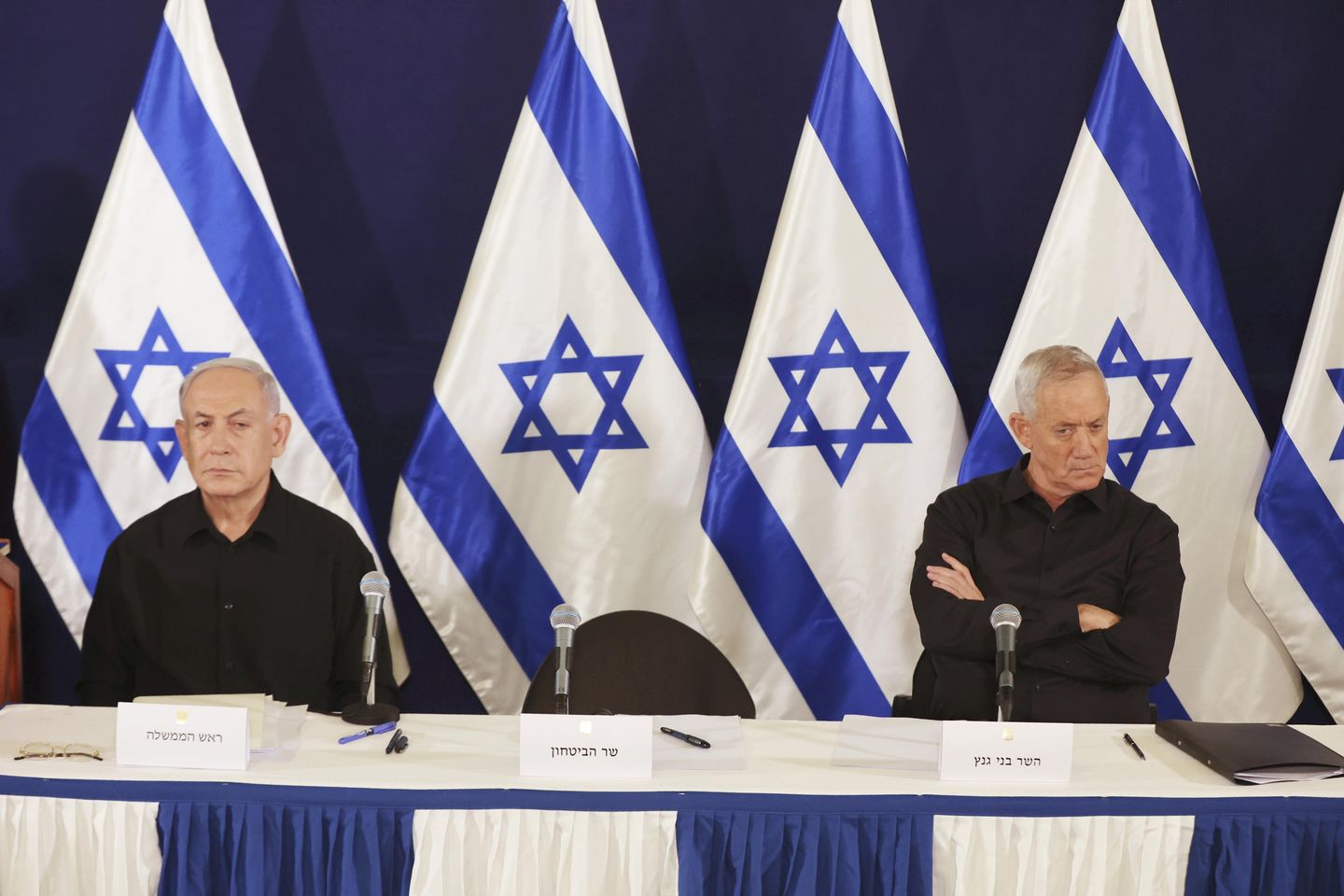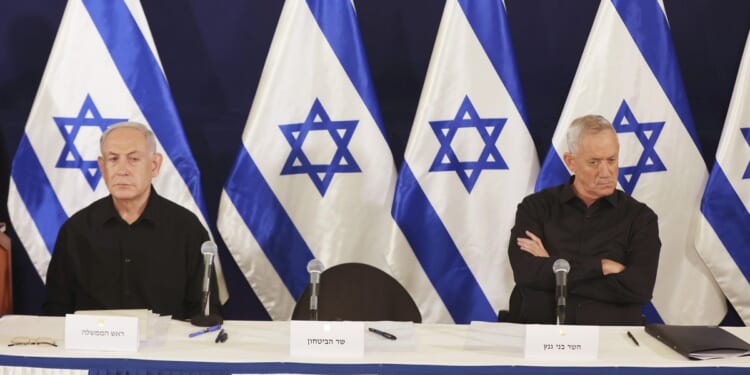
Tensions between the White House and Israeli Prime Minister Benjamin Netanyahu’s government neared the boiling point Monday as Biden administration officials ramped up public pressure on the Jewish state over “intolerable” humanitarian conditions in the Gaza Strip while embracing one of Mr. Netanyahu’s most popular political rivals.
In what seems to be a politically calculated move, Vice President Kamala Harris and other key administration officials met with Israeli official Benny Gantz. Mr. Netanyahu’s team downplayed the visit and rejected any suggestion that Mr. Gantz represented the prime minister.
The centrist Mr. Gantz, who joined the prime minister’s “war cabinet” after Hamas’ Oct. 7 terrorist attack on Israel, is widely viewed as one of Mr. Netanyahu’s chief political threats. Some recent polls show him to be more popular among Israelis than Mr. Netanyahu.
Mr. Gantz’s rogue trip to the U.S. threatens to undermine Mr. Netanyahu’s already fragile government, which is facing rapidly growing criticism over its handling of the war against Hamas in Gaza.
In the U.S., the meetings seem to signal that the Biden administration is eager to work with Israeli officials other than Mr. Netanyahu. By most accounts, the prime minister has a frosty relationship with President Biden and has rapidly fallen out of favor in liberal circles because of scenes of civilian suffering in Gaza and Israel’s unwillingness to provide clear end dates for its war.
Upon arriving in Washington, Mr. Gantz seemed to relish a chance to speak directly with top administration officials while dealing a public relations blow to Mr. Netanyahu.
“With friends, one must always speak openly, and that’s what we will do,” Mr. Gantz, a former Israeli defense minister and commanding general of Israel’s military, told reporters as he entered the White House, according to English-language media translations of his remarks, which were in Hebrew.
Mr. Gantz was also expected to meet with White House National Security Adviser Jake Sullivan and top congressional leaders during his stay in Washington. Administration officials were expected to privately press Mr. Gantz to pursue a cease-fire deal with Hamas and to take steps to reduce civilian casualties in Gaza.
Mr. Netanyahu was furious over Mr. Gantz’s visit, according to Israeli media. Citing a source close to Mr. Netanyahu, The Times of Israel reported that the Israeli leader informed Mr. Gantz that “the State of Israel only has one prime minister.” It appeared to be a warning against attempts to strike informal agreements with the White House behind Mr. Netanyahu’s back.
Mr. Netanyahu’s relationship with the Biden administration has deteriorated. The prime minister’s office denied media reports that Mr. Biden refused to take a phone call from Mr. Netanyahu last week. The office called the reports “fake news.”
Tensions between the two sides are clear. Mr. Biden, long a staunch supporter of Israel as a senator and as vice president, last month called Israel’s conduct of its military campaign in the Gaza Strip “over the top,” even as the U.S. stressed that the Jewish state has the right to defend itself after the horrific Hamas terrorist attack on Oct. 7.
Ms. Harris on Sunday offered the administration’s strongest rebuke to date of Israel’s handling of the situation in Gaza, where tens of thousands of Palestinians have been killed in the crossfire between Israel and Hamas militants, according to some estimates, and where scores of civilians lack access to medicine, food, water and shelter.
“People in Gaza are starving. The conditions are inhumane. And our common humanity compels us to act,” she said during a speech in Selma, Alabama. “And the Israeli government must do more to significantly increase the flow of aid. No excuses. They must open new border crossings. They must not impose any unnecessary restrictions on the delivery of aid. They must ensure humanitarian personnel, sites and convoys are not targeted. And they must work to restore basic services and promote order in Gaza so more food, water and fuel can reach those in need.”
Israel maintains that Hamas is to blame for the suffering. It says the Palestinian terrorist group routinely uses schools, hospitals and civilians as shields for its war against the Jewish state.
Increasing the pressure
With Mr. Gantz on American soil, the administration tried to drive home its message.
“The situation is simply intolerable” in Gaza, State Department spokesman Matthew Miller told reporters.
The U.S. has begun airdrops to deliver badly needed supplies to the Palestinian people, and Israel has allowed more aid to flow into the enclave. Mr. Miller said the amount of aid is “significantly below” the levels needed to avert a widespread famine.
The administration is pressing for a deal that would facilitate the release of an estimated 100 hostages still held by Hamas in exchange for a six-week pause in the fighting, allowing for more humanitarian aid to flow into Gaza. Israel is open to such a deal, but Hamas seems to be insisting on a much longer pause to the fighting, perhaps even a permanent end.
Hamas representatives met Monday with Egyptian mediators in Cairo for another round of cease-fire negotiations, though Israel declined to send officials to the talks.
Ms. Harris said now is the time to secure a deal.
“We’re in a window of time right now where we can actually get a hostage deal done. We all want this conflict to end as soon as possible, and how it does matters,” she told reporters.
The White House offered few details of the Harris-Gantz meeting. It mainly stuck to known talking points while acknowledging that the Netanyahu government had taken a “constructive approach” to negotiations.
Ms. Harris “expressed her deep concern about the humanitarian conditions in Gaza and the recent horrific tragedy around an aid convoy in northern Gaza,” the White House account said.
The vice president “discussed the urgency of achieving a hostage deal and welcomed Israel’s constructive approach to the hostage talks,” according to the readout.
The U.S. put pressure on Israel from other directions on Monday. Amid violence between Israel and the Lebanon-based militant group Hezbollah, special envoy Amos Hochstein visited Beirut in an effort to cool tensions.
The American diplomat warned that an Israel-Hezbollah war would not be “containable,” echoing the administration’s long-standing fear that Israel’s fight against Hamas in Gaza could eventually explode into a much wider Middle East war.
“The United States remains committed to advancing lasting security solutions achieved through [the] diplomatic process,” Mr. Hochstein said after meeting with Lebanese officials.
Meanwhile, Israeli rescuers said a foreign worker was killed and several others wounded by an anti-tank missile fired from Lebanon. The Magen David Adom rescue service said it treated seven people, including two in serious condition.
Since the Israel-Hamas war began, more than 215 Hezbollah fighters and nearly 40 civilians were killed on the Lebanese side. In Israel, nine soldiers and 10 civilians were killed in attacks, according to The Associated Press.
• This article is based in part on wire service reports.












